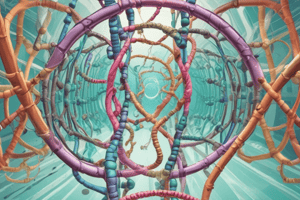Podcast
Questions and Answers
What is the primary goal of genetic engineering?
What is the primary goal of genetic engineering?
- To develop new medicines and vaccines
- To use biotechnology to alter an organism's genetic makeup
- To introduce new traits or characteristics into an organism (correct)
- To develop new biofuels and bioproducts
Which of the following is NOT a type of genetic engineering?
Which of the following is NOT a type of genetic engineering?
- Biolistics
- Microinjection
- Homologous recombination
- Gene therapy (correct)
What is the purpose of restriction enzymes in genetic engineering?
What is the purpose of restriction enzymes in genetic engineering?
- To seal gaps in DNA molecules
- To separate and analyze DNA molecules
- To cut DNA at specific sequences (correct)
- To amplify specific DNA sequences
Which of the following is an ethical concern related to genetic engineering?
Which of the following is an ethical concern related to genetic engineering?
What is the purpose of gel electrophoresis in genetic engineering?
What is the purpose of gel electrophoresis in genetic engineering?
What is an application of genetic engineering in agriculture?
What is an application of genetic engineering in agriculture?
What is the primary mechanism used to alter an organism's DNA sequence in genetic engineering?
What is the primary mechanism used to alter an organism's DNA sequence in genetic engineering?
What is the role of vectors in genetic engineering?
What is the role of vectors in genetic engineering?
What is the term for the process of converting DNA information into a functional product?
What is the term for the process of converting DNA information into a functional product?
What is the host organism in genetic engineering?
What is the host organism in genetic engineering?
What is the primary application of genetic engineering in medicine?
What is the primary application of genetic engineering in medicine?
What is the purpose of recombinant DNA technology in genetic engineering?
What is the purpose of recombinant DNA technology in genetic engineering?
What is the term for the process of creating a new DNA molecule by combining DNA molecules from different sources?
What is the term for the process of creating a new DNA molecule by combining DNA molecules from different sources?
What is the primary application of genetic engineering in biotechnology?
What is the primary application of genetic engineering in biotechnology?
What is the laboratory technique used to amplify specific DNA sequences?
What is the laboratory technique used to amplify specific DNA sequences?
What is the term for the modification of an organism's genes using biotechnology?
What is the term for the modification of an organism's genes using biotechnology?
Flashcards are hidden until you start studying
Study Notes
What is Genetic Engineering?
- The process of manipulating an organism's DNA to introduce new traits or characteristics
- Involves the use of biotechnology to alter an organism's genetic makeup
- Allows for the introduction of desirable traits from one species into another
Types of Genetic Engineering
- Microinjection: injecting genetic material into an organism's cells using a microinjection needle
- Vector-mediated gene transfer: using a vector (e.g. plasmid, virus) to introduce genetic material into an organism's cells
- Biolistics: using a gene gun to shoot genetic material into an organism's cells
- Homologous recombination: using an organism's own genetic machinery to introduce genetic changes
Applications of Genetic Engineering
- Agriculture: developing crops with improved yields, disease resistance, and nutrition
- Medicine: developing new medicines, vaccines, and gene therapies
- Bioremediation: using microorganisms to clean up pollutants in the environment
- Biotechnology: developing new biofuels, bioproducts, and biosensors
Tools and Techniques
- Restriction enzymes: enzymes that cut DNA at specific sequences, allowing for the insertion of new genes
- Ligase: enzyme that seals gaps in DNA, allowing for the formation of recombinant DNA molecules
- Polymerase chain reaction (PCR): amplifying specific DNA sequences for analysis or genetic engineering
- Gel electrophoresis: separating and analyzing DNA molecules based on size and charge
Ethical Considerations
- Safety concerns: unintended consequences of genetic engineering, such as gene flow into wild populations
- Ethical concerns: using genetic engineering for non-therapeutic enhancements, such as athletic or cognitive enhancements
- Intellectual property: ownership and patenting of genetically engineered organisms and genes
- Regulation: government regulations and guidelines for genetic engineering research and applications
Studying That Suits You
Use AI to generate personalized quizzes and flashcards to suit your learning preferences.




